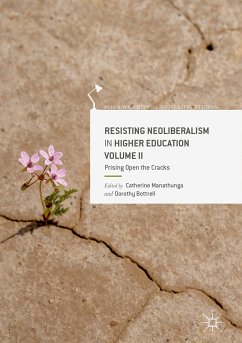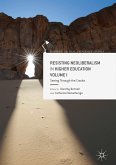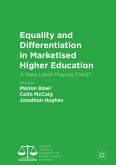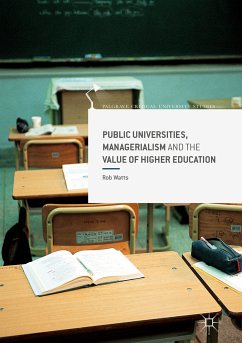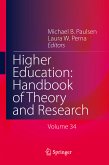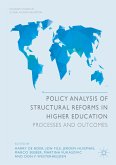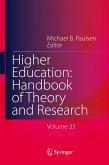Resisting Neoliberalism in Higher Education Volume II (eBook, PDF)
Prising Open the Cracks
Redaktion: Manathunga, Catherine; Bottrell, Dorothy


Alle Infos zum eBook verschenken

Resisting Neoliberalism in Higher Education Volume II (eBook, PDF)
Prising Open the Cracks
Redaktion: Manathunga, Catherine; Bottrell, Dorothy
- Format: PDF
- Merkliste
- Auf die Merkliste
- Bewerten Bewerten
- Teilen
- Produkt teilen
- Produkterinnerung
- Produkterinnerung

Hier können Sie sich einloggen

Bitte loggen Sie sich zunächst in Ihr Kundenkonto ein oder registrieren Sie sich bei bücher.de, um das eBook-Abo tolino select nutzen zu können.
This book outlines the creative responses academics are using to subvert powerful market forces that restrict university work to a neoliberal, economic focus. The second volume in a diptych of critical academic work on the changing landscape of neoliberal universities, the editors and contributors examine how academics 'prise open the cracks' in neoliberal logic to find space for resistance, collegiality, democracy and hope. Adopting a distinctly postcolonial positioning, the volume interrogates the link between neoliberalism and the ongoing privileging of Euro-American theorising in…mehr
- Geräte: PC
- ohne Kopierschutz
- eBook Hilfe
- Größe: 6.73MB
![Resisting Neoliberalism in Higher Education Volume I (eBook, PDF) Resisting Neoliberalism in Higher Education Volume I (eBook, PDF)]() Resisting Neoliberalism in Higher Education Volume I (eBook, PDF)113,95 €
Resisting Neoliberalism in Higher Education Volume I (eBook, PDF)113,95 €![Equality and Differentiation in Marketised Higher Education (eBook, PDF) Equality and Differentiation in Marketised Higher Education (eBook, PDF)]() Equality and Differentiation in Marketised Higher Education (eBook, PDF)73,95 €
Equality and Differentiation in Marketised Higher Education (eBook, PDF)73,95 €![The Toxic University (eBook, PDF) The Toxic University (eBook, PDF)]() John SmythThe Toxic University (eBook, PDF)27,95 €
John SmythThe Toxic University (eBook, PDF)27,95 €![Public Universities, Managerialism and the Value of Higher Education (eBook, PDF) Public Universities, Managerialism and the Value of Higher Education (eBook, PDF)]() Rob WattsPublic Universities, Managerialism and the Value of Higher Education (eBook, PDF)89,95 €
Rob WattsPublic Universities, Managerialism and the Value of Higher Education (eBook, PDF)89,95 €![Higher Education: Handbook of Theory and Research (eBook, PDF) Higher Education: Handbook of Theory and Research (eBook, PDF)]() Higher Education: Handbook of Theory and Research (eBook, PDF)161,95 €
Higher Education: Handbook of Theory and Research (eBook, PDF)161,95 €![Policy Analysis of Structural Reforms in Higher Education (eBook, PDF) Policy Analysis of Structural Reforms in Higher Education (eBook, PDF)]() Harry De BoerPolicy Analysis of Structural Reforms in Higher Education (eBook, PDF)65,95 €
Harry De BoerPolicy Analysis of Structural Reforms in Higher Education (eBook, PDF)65,95 €![Higher Education: Handbook of Theory and Research (eBook, PDF) Higher Education: Handbook of Theory and Research (eBook, PDF)]() Higher Education: Handbook of Theory and Research (eBook, PDF)97,95 €
Higher Education: Handbook of Theory and Research (eBook, PDF)97,95 €-
-
-
Dieser Download kann aus rechtlichen Gründen nur mit Rechnungsadresse in A, B, BG, CY, CZ, D, DK, EW, E, FIN, F, GR, HR, H, IRL, I, LT, L, LR, M, NL, PL, P, R, S, SLO, SK ausgeliefert werden.
- Produktdetails
- Verlag: Springer International Publishing
- Seitenzahl: 325
- Erscheinungstermin: 18. Dezember 2018
- Englisch
- ISBN-13: 9783319958347
- Artikelnr.: 54785752
- Verlag: Springer International Publishing
- Seitenzahl: 325
- Erscheinungstermin: 18. Dezember 2018
- Englisch
- ISBN-13: 9783319958347
- Artikelnr.: 54785752
- Herstellerkennzeichnung Die Herstellerinformationen sind derzeit nicht verfügbar.
Neoliberal University: A Foucauldian Perspective; Rille Raaper.- Chapter 9. Professional Doctorates as Spaces of Collegiality and Resistance: A Cross-Sectoral Exploration of the Cracks in Neoliberal Institutions; Catherine Manathunga, Peter Shay, Rosemarie Garner, Preetha Kolakkot Jayaram, Paul Barber, Bhatti Thi Kim Oanh, Sunny Gavran, Loretta Konjarski, and Ingrid D'Souza.- Chapter 10. Interrogating the "Idea of the University" Through the Pleasures of Reading Together; Tai Peseta, Jeanette Fyffe, and Fiona Salisbury.- Chapter 11. Neoliberalism in Thai and Indonesian Universities: Using Photo-Elicitation Methods to Picture Space for Possibility; James Burford and Teguh Wijaya Mulya.- Chapter 12. Making Visible Collegiality of a Different Kind; Mark Selkrig, Ron "Kim" Keamy, Kirsten Sadler, and Catherine Manathunga.- Chapter 13. Seeking an Institution-Decentring Politics to Regain Purpose for Australian University Futures;Marie Brennan and Lew Zipin.- Chapter 14. Prising Open the Cracks Through Polyvalent Lines of Inquiry; Catherine Manathunga and Dorothy Bottrell.
Neoliberal University: A Foucauldian Perspective; Rille Raaper.- Chapter 9. Professional Doctorates as Spaces of Collegiality and Resistance: A Cross-Sectoral Exploration of the Cracks in Neoliberal Institutions; Catherine Manathunga, Peter Shay, Rosemarie Garner, Preetha Kolakkot Jayaram, Paul Barber, Bhatti Thi Kim Oanh, Sunny Gavran, Loretta Konjarski, and Ingrid D'Souza.- Chapter 10. Interrogating the "Idea of the University" Through the Pleasures of Reading Together; Tai Peseta, Jeanette Fyffe, and Fiona Salisbury.- Chapter 11. Neoliberalism in Thai and Indonesian Universities: Using Photo-Elicitation Methods to Picture Space for Possibility; James Burford and Teguh Wijaya Mulya.- Chapter 12. Making Visible Collegiality of a Different Kind; Mark Selkrig, Ron "Kim" Keamy, Kirsten Sadler, and Catherine Manathunga.- Chapter 13. Seeking an Institution-Decentring Politics to Regain Purpose for Australian University Futures;Marie Brennan and Lew Zipin.- Chapter 14. Prising Open the Cracks Through Polyvalent Lines of Inquiry; Catherine Manathunga and Dorothy Bottrell.
